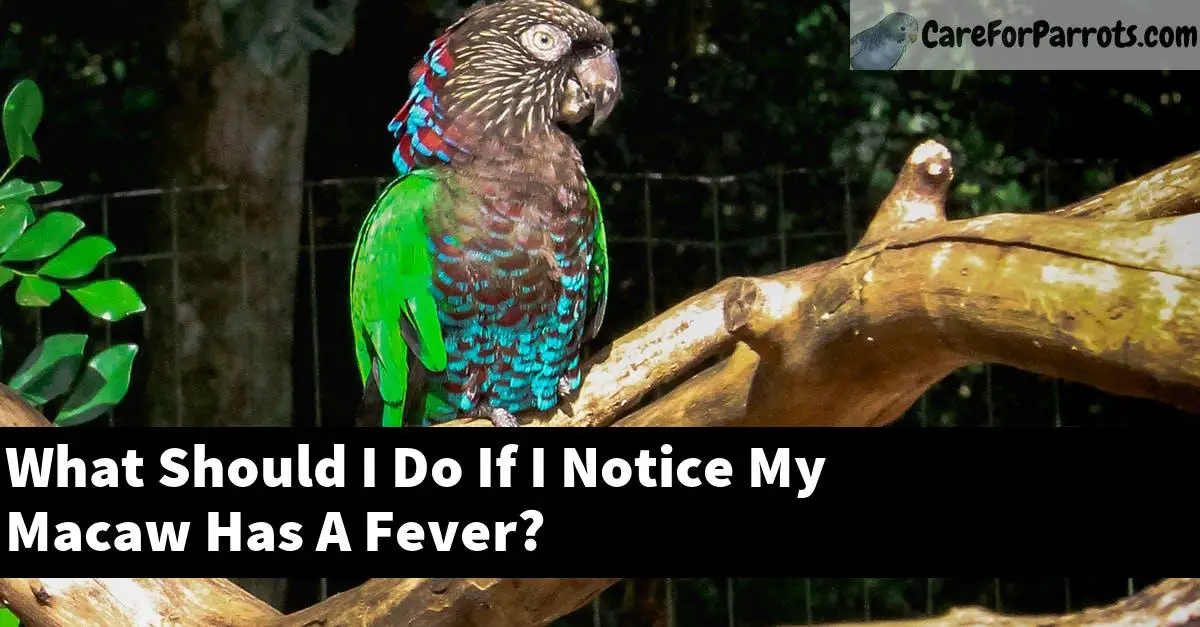If you notice your macaw has a fever, you should take them to the veterinarian for a check-up. A fever can be a sign of a variety of problems, so it is important to get it checked out.
Table of Contents
What should I do if I notice my macaw has a fever?
If you notice that your macaw has a fever, the first thing you should do is to take the bird to a qualified avian veterinarian. A fever is a common symptom of a number of diseases and can indicate a number of underlying problems.
It is important to rule out these potential causes before making any other decisions. In some cases, a fever may be the result of a minor infection and will go away on its own.
If the fever lasts for more than a day or if the bird becomes lethargic or has other signs of illness, it is important to take the bird to a veterinarian. There are a number of possible causes of fever in macaws, and the bird may require treatment for one or more of these conditions.
How can I tell if my macaw has a fever?
A macaw’s normal temperature ranges from around 100 to 102 degrees Fahrenheit. If your bird is showing any of the following signs, it may have a fever:
• Increased activity
• Shivering
• Swelling of the neck, chest, or abdomen
• Rapid breathing
• Poor appetite
• Yellow skin and gums
• Slurred speech
If your bird is exhibiting any of these signs, take it to the veterinarian immediately.
What are the symptoms of a fever in a macaw?
A fever in a macaw is typically a sign of illness and should be checked out by a veterinarian. fever in a macaw can be caused by a number of infections, such as upper respiratory tract infection, pneumonia, or bronchitis.
Other causes of fever in a macaw can include viral infections, such as Newcastle disease, and bacterial infections, such as Escherichia coli (E. coli) or Salmonella.
In some cases, a fever in a macaw may be the result of a systemic disease, such as leukemia, and the bird will need treatment. If the fever is high enough, a macaw may also develop a rash or other signs of illness.
Matiniy 2 Pcs Pirate Parrot on Shoulder Life Sized Artificial Parrot Toy for Costume Dress-up Accessory for Halloween Party(Multicolor)
$13.99 (as of 21/06/2025 00:55 GMT +03:00 - More infoProduct prices and availability are accurate as of the date/time indicated and are subject to change. Any price and availability information displayed on [relevant Amazon Site(s), as applicable] at the time of purchase will apply to the purchase of this product.)BBjinronjy Large Parrot Toys Bird Chewing Toys-Natural Nuts Corn Loofah Wooden Bird Cage Toy for African Grey,Macaws,Conure,Cokatoos,Cockatiel,Amazon Parrots and Other Medium and Small Birds
$12.99 (as of 21/06/2025 00:55 GMT +03:00 - More infoProduct prices and availability are accurate as of the date/time indicated and are subject to change. Any price and availability information displayed on [relevant Amazon Site(s), as applicable] at the time of purchase will apply to the purchase of this product.)LAFEBER'S Classic Nutri-Berries Pet Bird Food, Made with Non-GMO and Human-Grade Ingredients, for Parrots, 3.25 lb
$39.89 ($12.27 / lb) (as of 20/06/2025 22:58 GMT +03:00 - More infoProduct prices and availability are accurate as of the date/time indicated and are subject to change. Any price and availability information displayed on [relevant Amazon Site(s), as applicable] at the time of purchase will apply to the purchase of this product.)What causes fevers in macaws?
There are a few potential causes of fever in macaws. The most common is an infection, either from the environment or from another bird.
Other causes can be cancer, trauma, or some kind of metabolic problem. In most cases, the cause of the fever is determined by a combination of tests, including a blood test, a CT scan, and a radiology scan.
Treatment typically involves antibiotics and/or cooling the bird down. If the fever is caused by an infection, it usually goes away on its own after a few days.
If the fever is caused by another source, treatment usually involves getting the bird evaluated and treated.
How can I treat my macaw’s fever?
A macaw’s fever can be treated with paracetamol, ibuprofen, or a combination of both. It is important to keep the bird hydrated and give them food that is high in energy.
If the fever does not go down within 24 hours, the bird should be taken to the vet.
Is it dangerous for a macaw to have a fever?
There is no definitive answer to this question as fever can be a common sign of a wide variety of illnesses in both birds and mammals. However, in general, it is generally safe for macaws to have a fever as long as the fever is not too high and does not persist for an extended period of time.
If a macaw has a fever and begins to show any other unusual signs or symptoms, such as lethargy, seizures, or difficulty breathing, then it is important to seek veterinary help as soon as possible.
Can fevers in macaws be prevented?
There is no one definitive answer to this question as it depends on the individual macaw’s overall health, diet, and lifestyle. However, some general tips that may help prevent fevers in macaws include providing them with fresh, clean water and food, and keeping their cages clean and free of bacteria.
Additionally, it is important to monitor the birds’ temperatures regularly and take any necessary steps to treat any fevers or illnesses as soon as they occur.
Summary
A fever can be a sign of a variety of problems and it is important to get it checked out by a veterinarian.
























